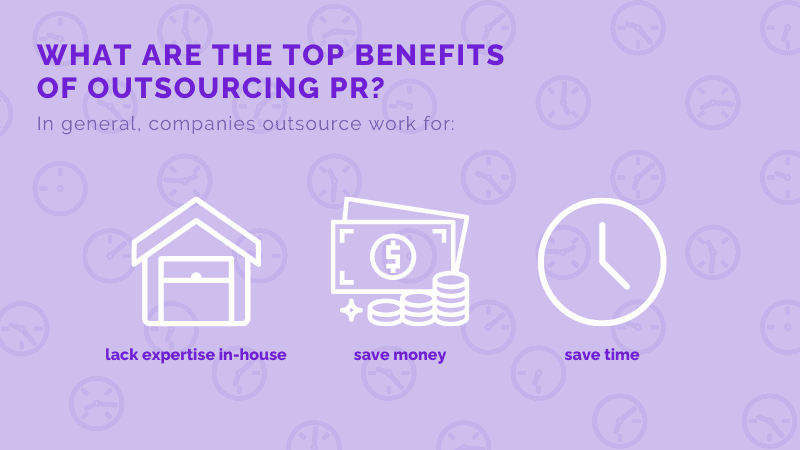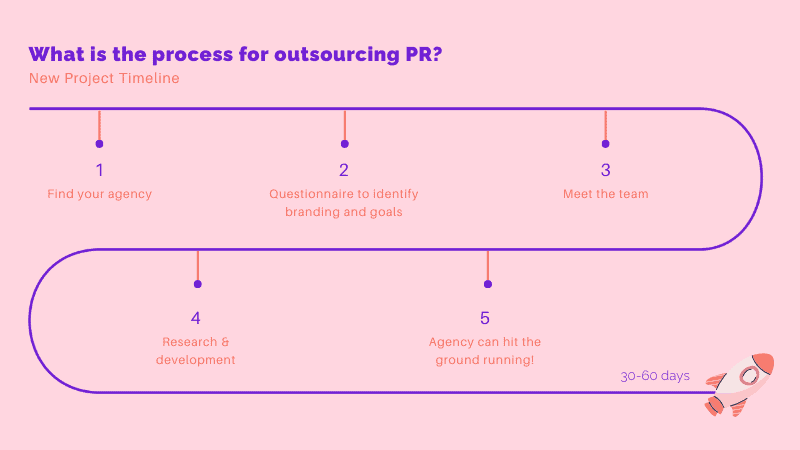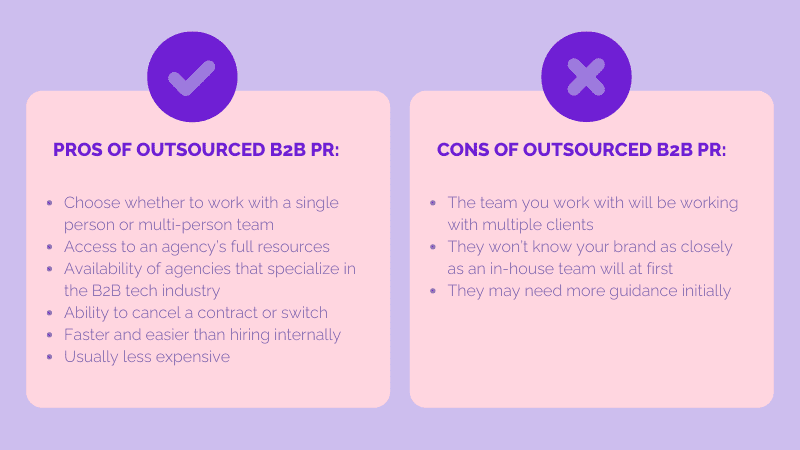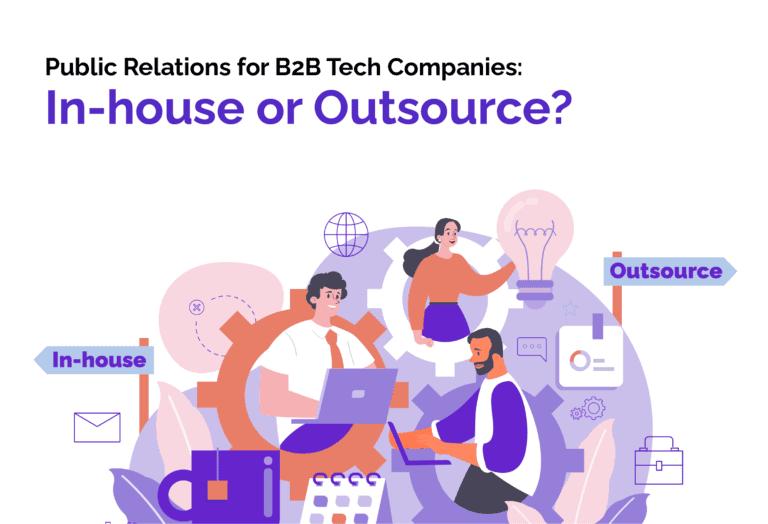So your B2B tech company has hit its stride. You’re signing new clients, honing your product offerings, and even attracting some industry attention.
The time has come: you’re ready to invest in PR and marketing.
Good decision. 👏
Now, though, you’ve got another choice to consider: should you keep it in-house, or go with an outsourced PR agency?
That will depend on everything from your team’s strengths, to your budget, to your goals. In this guide, we’ll walk you through what outsourced marketing and PR look like, as well of the benefits of each.
First, however, let’s look at what PR can bring your brand, and why you need it.
Outsourced PR and marketing help tech companies stand out and dominate their niche in an extremely crowded market
Any company can benefit from digital PR efforts, but B2B tech companies, in particular, need them if they’re going to establish themselves long-term.
Take a look at these numbers for context:
- By the end of 2021, the U.S. tech industry was projected to be valued around $1.6 trillion.
- 13,400 tech startups were launched in 2020 (Techcrunch).
- The tech industry employed 12.2 million people in the U.S. in 2020.
- In 2021, U.S. startups raised double the amount of capital they did just the year before—$330 billion in 2021, to 2020’s (also record-breaking) $167 billion.

As you can see, the industry is massive, and continually growing (although the rate of failure for tech startups is also high at 63%, according to Embroker). We hate to break it to you, but the chances of standing out from the other 556,999 companies in your industry based on the merits of your product alone are basically zero.
With the amount of content, advertising, and just plain noise on the internet, the only way to grab market share and make yourself top-of-mind among your audience is through PR: specifically, by layering digital PR with traditional PR efforts.
Related content: WTF is the Mixed Marketing Model? A Look at Our Digital Marketing and PR strategy
For many startups, and even established tech companies, hiring an in-house PR team is unrealistic. This is especially true in the wake of the Great Resignation, which has seen so many employees leaving their jobs to become freelancers or start their own businesses.
That’s why outsourced PR is on the rise in 2022.
What does outsourced B2B PR look like?
When you outsource your PR, you’ll be working either with a freelance media specialist or with an agency (depending on how extensive your needs are).
If you choose to go with a freelancer, he or she will likely handle functions like generating ideas for story angles and pitching media. He or she may also write press releases, news briefs, and other short, newsy-type content for distribution.
Some media specialists also offer social media services, so that’s something to ask when you’re initially interviewing potential freelancers.

Using an outsourced PR agency will give you access to more support and a wider range of PR services. If you sign on with an agency, you’ll have a team of people on your account. That team may include any or all of the following:
- An account manager who handles your communications and client relations.
- A media specialist who handles PR strategy and pitching
- A copywriter or content specialist who assists in writing articles, conducting interviews with your leadership, and otherwise supporting the content creation process
- A social media specialist who handles your social media presence
- A graphic designer to create visual assets to include with pitches and on social media
Together, this team will develop a cohesive PR strategy for your brand based on your own knowledge and research—any B2B buyer personas you’ve developed, your audience data, goals, etc.—as well as their own research into your brand, the audiences you’d like to reach, and their knowledge of and connections in the tech media.
What are the top benefits of outsourcing PR?
In general, companies outsource work for two reasons:
- They don’t have the expertise in-house.
- They want to save money and time.
Outsourcing your PR can accomplish both of these things.

For one thing, many tech companies, especially when they’re just starting, need to focus on building out their product and executive teams. B2B marketing and PR is often one of the last departments to get any attention, even though it’s indispensable to a tech company’s success.
Staffing a full-time marketing and PR agency, however—with a social media specialist, a media specialist, content writers, a CMO, and junior and senior marketers—is a massive undertaking for startups that are already operating on short timelines and under immense financial pressure.
Given this fact, as well as the length and difficulty of the hiring process post-pandemic, outsourcing these functions is not just a good idea, but a necessity. After all, marketing has to start ramping up long before a startup launches its first product.
If you don’t have a marketing team ready to go months ahead of time, any in-house team you hire will be coming on board woefully behind schedule and needing to scramble to put together a comprehensive product launch plan.
Outsourced PR agencies, however, are designed to ramp up and execute quickly, which is invaluable in the fast-paced world of B2B tech.
When it comes to the resource end of things—time and money—outsourcing PR can save a great deal of both.
First, let’s talk time.
An agency has a ready-made team of PR and marketing professionals that approach your brand as a team. They’ve worked together before, they each have well-defined roles, and they know exactly what it is they’re supposed to contribute. A well-functioning PR agency is like a well-oiled machine, with processes, protocols, and deliverables already in place.
As long as you thoroughly vet the PR agency you choose to ensure that they’ve got the experience and expertise needed to drive success, any outsourced PR team you go with will be able to save you significant amounts of time.
Now for finances.
Many outsourced PR agencies offers services a la carte, which means you can pick and choose which services you want to use (and pay for).
If you do need a full package of services, most agencies can create one for you or have offerings ready-made depending on the degree of help you need.
Both of these approaches can save your company money, considering the initial and long-term costs of hiring a full team.
What is the process for outsourcing PR?
Now let’s consider outsourcing your B2B PR to a freelancer or agency that specializes in your industry.
Once you’ve found your candidates through word-of-mouth, online searches, social media, or a gig worker platform, conducted your interviews, and signed on with one of them, here’s what the process will likely look like.
If it’s a freelancer you’re working with, it will be fairly straightforward: you’ll conduct all your business with that one person, who will bring you media opportunities like guest posts, inclusion in a news article, and interview opportunities on TV, podcasts, online series, and/or radio shows. They’ll also request sound bites and quotes to have on hand for answering reporter queries.
With an agency, of course, the process will be a bit more complex.

First, you’ll likely fill out a questionnaire or document asking about your tech brand, your PR goals, your product or service, and where you’ve been featured before, if anywhere.
Then you’ll meet your team on a call or video chat. These “getting to know you” calls, as we call them at Zen, are essential in order for your agency team to get a good feel for who you are, what your brand does, and who your audience is.
Your team will also be researching your brand, your product, and your competitors during this time.
While most agencies are prepared to ramp up quickly, with B2B tech, the research period can sometimes take longer than for other industries due to the complexity of the product or service.
Medtech, fintech, and enterprise tech, for example, require a nuanced understanding of technology and the differentiators that make one company stand out from the rest. Whether that’s your API integrations, your commitment to privacy, investment in cybersecurity, or deep knowledge of the regulatory environment, B2B tech buyers have specific criteria and needs—and your PR team has to know how to connect with those needs.
This is one reason why, if you choose to outsource, you may want to consider a PR firm that specializes in B2B tech. That way, you know your agency team already has the background and understanding of your industry to enable them to hit the ground running.
Pros and cons of outsourced PR
PROS OF OUTSOURCED B2B PR:
- Choose whether to work with a single person or multi-person team, based on your needs and budget
- Access to an agency’s full resources, from content writing to social media to creative to PR specialists
- Availability of agencies that specialize in the B2B tech industry, resulting in less ramp-up time
- Ability to cancel a contract or switch if the agency or freelancer doesn’t meet expectations
- Faster and easier than hiring internally
- Usually less expensive than hiring an internal team
CONS OF OUTSOURCED B2B PR:
- The team you work with will be working with multiple clients, so you’re sharing their time and energy
- They won’t know your brand as closely as an in-house team will
- They may need more guidance initially, although this need will decrease as your relationship continues
As you can see, deciding whether to hire internally or outsource your B2B tech PR is a decision that depends on many factors. Whichever you choose, you’ll need to consider your goals, budget, and timeline, among other things, as well as how involved you want your PR efforts to be long-term.

Outsourcing Your Marketing: Working with a Virtual CMO
Virtual marketing partners, or a virtual CMO, are becoming increasingly popular with businesses of all sizes.
In this post, we’re going to dive into this development. We’ll discuss why more companies are turning to virtual marketing partners, what the benefits of this approach are, and how your brand can ensure you’re getting the most of a virtual marketing partner engagement.
Why are companies turning to virtual marketing partners?
For one thing, the Great Resignation has left many companies scrambling to fill full-time positions, from the executive level on down.
Related post: B2B Marketing Trends to Know in the First Half of 2022
For another, the CMO position is a notoriously thorny one. Not only do they have the highest turnover rate in the executive suite, but CMOs also report the lowest levels of job satisfaction compared to other C-level positions.
And this goes the opposite direction, too. According to the Harvard Business Review, a full 80% of CEOs “don’t trust or are unimpressed” by their CMOs.
That gives you an idea of the scale of this problem, for both CMOs and the companies they work for (or, perhaps more likely, have recently left).
By becoming a virtual CMO, CMOs gain more autonomy over their work. They can provide specific services to specific brands, based on what those brands need. While the scope can change and evolve over time, a CMO who enters into this kind of arrangement will know exactly what duties they’re expected to fulfill because it’s written out in a contract.
On the organization’s side, CEOs who have struggled to find a full-time CMO they trust can contract a virtual CMO to carry out specific duties and oversee specific marketing needs—without the stress of finding and paying a full-time executive.
What’s the difference between a virtual marketing partner and a virtual CMO?
A virtual marketing partner is essentially a marketing agency: a company with lots of different marketing capabilities that can handle as much or as little of your brand’s marketing as you need.
However, attention should be paid to the term “partner.” Agencies that consider themselves marketing partners, like Zen, approach the client relationship differently. It’s a much more collaborative, engaged partnership than one might find at a traditional marketing agency, which is more “set it and forget it.”
A virtual CMO on the other hand is one individual who manages your marketing department and marketing needs. If you have marketers in-house, but no department head, a virtual CMO can manage your team, lead strategy sessions, oversee and develop your marketing budget, and do everything else that a department head would be responsible for.
If you do not have an in-house marketing department, a virtual CMO would work with your executive team to vet and engage an outside agency or virtual marketing partner to provide the services you need. That could include:
- B2B PR
- Paid advertising campaigns
- Social media marketing
- Content marketing
- Event marketing
- Thought leadership
And more.
Some virtual CMOs are already connected to a virtual marketing partner (as in Zen’s case), which means that by hiring the CMO, you get access to additional services and marketing professionals.
What are the benefits of hiring a virtual marketing partner?
Virtual marketing partners offer a host of benefits for organizations, from small businesses to enterprises.
These include:
- The ability to pay for what you need—a la carte services and pricing
- The expertise of a CMO without the expense of salary and benefits for a full-time executive
- Access to additional services as needed
- Ability to terminate a contract if the marketing partner isn’t meeting your standards or providing what you need
- Ability to evolve the contract to involve more or fewer services
- Option to have your virtual CMO train a full-time employee to take over marketing duties
What types of services are available through a virtual marketing partner?
This will vary depending on the marketing partner, but in Zen’s case, we offer:
- Traditional and digital PR
- Strategy and media planning
- Features and mentions in tier-one and trade publications
- Strategic audio and podcast interviews
- Media training
- Media relations and list building
- Crisis communication
- Content generation for articles, press releases, and bylines
- Briefing documents, messaging, FAQs, etc.
- Social media
- Campaign strategy and management
- Daily posting (including content and imagery)
- Community building
- Paid ad campaigns and retargeting
- Content marketing including:
- Blog posts
- Email marketing
- Infographics
- White papers
- Case studies
- Graphic design
- SEO and SEM
How can you get the most out of an engagement with a virtual marketing partner?
The first step in creating a productive relationship with your virtual marketing partner is to understand what you need.
- Do you need broad oversight and management of your in-house team?
- Do you have a major product launch or another milestone approaching, and need help managing a specific campaign?
- Do you need to make better use of your marketing budget?
Once you have at least a general idea of what you’re looking for, you can start vetting potential partners. Ask these candidates about the services they offer, how they work, how they bill, and how open they are to changing the contract or deliverables over time. You may also want to ask about client churn rate and request testimonials from other clients.
And as with anything, do your research online. What’s the company’s social presence like? How effective is their website? You want to make sure the agency you work with is marketing themselves the way you’d want to be marketed.
When you’ve found one that offers the services you need and that you like the look of, schedule a brief call to see whether you want to take things to the next step.
If so, you’ll want to outline what you need, while also asking your virtual marketing partner or virtual CMO for their recommendations. Remember, you’re engaging them for their strategic guidance as much as you are for execution.
From there, it’s a matter of keeping in connection with your virtual CMO or virtual marketing partner, especially if you’re engaging them for PR services. By making yourself or your team available as needed, while also staying open about your expectations, your company’s needs, and what you’d like to improve, you can develop a long-term relationship with your virtual marketing partner that is as effective, if not more so, than having a full in-house marketing department.
Virtual marketing partners offer all kinds of benefits for B2B companies, and those benefits only continue to grow as the workforce—and the way we work—changes.



